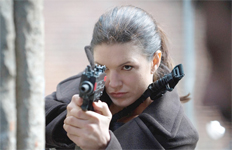Haywire
|  Steven Soderbergh’s Haywire is a slight genre exercise built on a spare, straight-to-video backbone and fleshed out with Soderbergh’s experimental attitude and an impressive cast of actors, most of whom probably didn’t spend more than a few days on set before picking up their paychecks. Given that Soderbergh has dabbled in virtually every other genre known to contemporary cinema, from low-budget dramas (1989’s sex, lies, and videotape), to big-budget star vehicles (the three Ocean’s films), to no-budget video experiments (2005’s Bubble), with science fiction (2002’s Solaris), topical social drama (2001’s Traffic), and bizarro comedy (1996’s Schizopolis) in between, a straight-up action movie is one of the last boxes left to be checked before he follows through on his much talked-about early retirement. Steven Soderbergh’s Haywire is a slight genre exercise built on a spare, straight-to-video backbone and fleshed out with Soderbergh’s experimental attitude and an impressive cast of actors, most of whom probably didn’t spend more than a few days on set before picking up their paychecks. Given that Soderbergh has dabbled in virtually every other genre known to contemporary cinema, from low-budget dramas (1989’s sex, lies, and videotape), to big-budget star vehicles (the three Ocean’s films), to no-budget video experiments (2005’s Bubble), with science fiction (2002’s Solaris), topical social drama (2001’s Traffic), and bizarro comedy (1996’s Schizopolis) in between, a straight-up action movie is one of the last boxes left to be checked before he follows through on his much talked-about early retirement.The problem is that Haywire doesn’t feel like much more than a checked-off box. Soderbergh demonstrates that he is a capable choreographer of action, and he gives the film’s violence a compelling twist by playing it in a cool, clinical manner that emphasizes sheer physicality while downplaying manipulative cinematic flourishes like hyperkinetic editing and overbearing music. He establishes the film’s tone in its opening sequence, which finds the protagonist, a former Marine-turned-black ops professional named Mallory Kane (Gina Carano), waiting to meet someone at a roadside diner in wintry upstate New York. When Aaron, a bulky fellow black ops specialist played by Channing Tatum, shows up, the tension between them is so thick that it can only be broken by an all-out brawl involving lots of body slamming, bone cracking, and glass shattering. Soderbergh orchestrates the action with great skill, making us feel the impact of every punch, kick, and thud of bodies hitting inanimate objects, which is duly thrilling at first. However, once we begin to realize that this is all the film has to offer, it starts to sink into a repetition of diminishing returns that can only be saved by an enthralling narrative or complex characters. Alas, the film offers neither. The screenplay by Lem Dobbs, who last penned The Score in 2001 and previously worked with Soderbergh on Kafka (1991) and The Limey (1999), is temporally fractured, which supplies the illusion of more depth than is actually there in its cobbled-together story of betrayal and vengeance. Mallory is sold out by Kenneth (Ewan McGregor), her handler and former lover who tries to get rid of her after he conspires with Rodrigo (Antonio Banderas), a Spaniard of questionable background, and Coblenz (Michael Douglas), an American operative, in an elaborate job that tricks Mallory into believing she is freeing a dissident Chinese journalist. Kenneth then pairs her with Paul (Michael Fassbender), a supposed MI-6 agent who tries to frame her for the journalist’s murder and then kill her in a hotel room. The plan, alas, does not pan out, which leaves Mallory in the desperate situation of having to clear her name while also exacting her revenge on Kenneth and his cronies. The various betrayals and plot twists hold little interest, mainly because none of the characters emerge as anything other than narrative placeholders and most of the dialogue is simple exposition. Carano, an internationally renowned mixed martial artist of great physical dexterity and limited acting chops, has a decidedly mean screen presence, and her lithe physicality and head-jangling speed make the fight scenes a genuine pleasure to watch—violence made into art. Soderbergh should be commended for not objectifying her as too many male directors do with their action heroines; there is even a wry commentary on female objectification when Kenneth asks Mallory to pose as arm candy with Paul, and she reacts by saying she wouldn’t know how to do that. Unfortunately, as an actress Carano is significantly more limited than her fighting skills. She is quite adept at furrowing her brow and conveying intense concentration, and she can look genuinely frightening in her intensity, particularly in a scene where she locks eyes with an adversary while squeezing the life out of him with her thighs. But, any time she is asked to dig into the human being beneath the human weapon, there isn’t much there; we might surmise that she has simply been hardened into inhumanity by her life as a killer, but that seems too easy an explanation and one that lacks any real evidence in the story itself. Of course, the emotional disconnect in the film could very well be an intended part of its stoic tone and deliberate refusal to pander to the stylistic overkill of most contemporary action films, although similarly toned films like Drive (2011) and Hanna (2011) proved that an austere tone doesn’t necessarily preclude emotional involvement. Thus, when it’s in full beatdown mode, Haywire is an engaging enough diversion, but be wary of asking for anything more. Copyright ©2011 James Kendrick Thoughts? E-mail James Kendrick All images copyright © Relativity Media |
Overall Rating: 

 (2.5)
(2.5)


